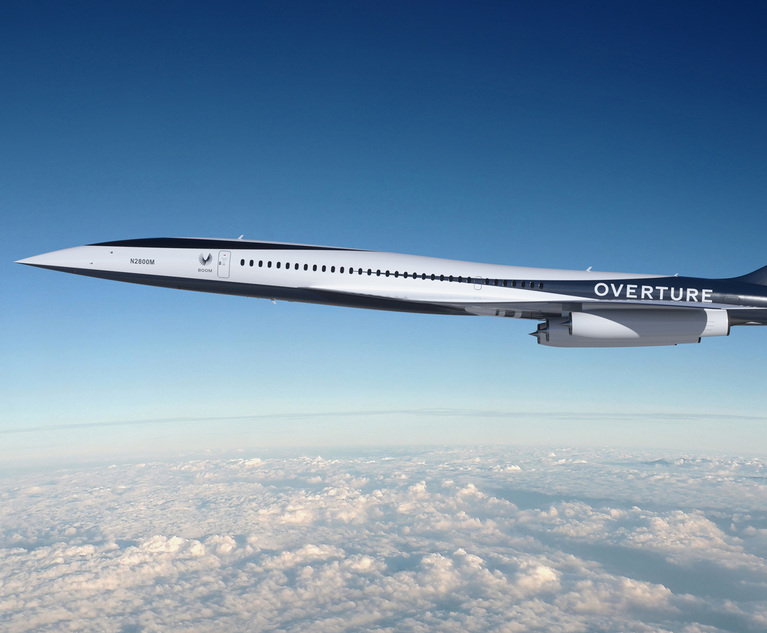 A Boom Supersonic Overture aircraft. Photo: Boom Supersonic via AP
A Boom Supersonic Overture aircraft. Photo: Boom Supersonic via AP American Airlines Places Deposit on 20 Supersonic Planes
"Looking to the future, supersonic travel will be an important part of our ability to deliver for our customers," said American Airlines's chief financial officer.
August 16, 2022 at 02:09 PM
4 minute read
American Airlines has agreed to buy up to 20 supersonic jets and put down a nonrefundable deposit on the planes that are still on the drawing board and years away from flying.
Neither American nor the manufacturer Boom Supersonic would provide financial details Tuesday, including the size of American's deposit.
American, which also took options for 40 more Boom Overture planes, becomes the second U.S. customer for Boom after a similar announcement last year from United Airlines for 15 jets.
It has been nearly 20 years since the last supersonic passenger flight by Concorde, the British-French plane that failed to catch on because of the high cost — both for passengers and airlines.
Boom CEO Blake Scholl insists his company's plane will be different when it debuts in 2029, with tickets costing about $4,000 to $5,000 to fly from New York to London in about three and one-half hours.
"There are tens of millions of passengers every year flying in business class on routes where Overture will give a big speed-up," Scholl said in an interview, "and airlines will be able to do it profitably."
Boom says its plane will have a top speed of 1.7 times the speed of sound, or about 1,300 mph, and carry between 65 and 80 passengers.
Skeptics have questioned Boom's ambitious timetable, especially in light of the many years it has taken Boeing, an established manufacturer, to get planes or even retrofits to planes approved by the Federal Aviation Administration.
Notably, Boom does not yet have an engine manufacturer lined up. It is talking with Rolls Royce and others.
"With a supersonic jet, you don't design a plane, you design an engine first," said Richard Aboulafia, an aerospace analyst at consultant AeroDynamic Advisory. "This is just a collection of freehand drawings until that engine happens."
Boom says the plane will fly entirely on sustainable aviation fuel, often made from plant material, which is currently in short supply and very expensive.
Boom, which is based in Denver and plans to build the Overture in North Carolina, says the program will cost between $6 billion and $8 billion. The plane carries a list price of $200 million, although other manufacturers routinely give airlines deep discounts.
Last month, Boom announced changes to the plane's design to make it simpler and less expensive to build and maintain. The most striking change was going from three engines, including a different type on the tail, to four identical engines under the delta-shaped wings.
The market for four-engine planes is shrinking. The Boeing 747 is used mostly for hauling cargo now, and Airbus shut down production of the A380 in 2021. The vast majority of passenger jets flying today have two engines.
Four-engine planes "are that much worse from every standpoint, from economics to emissions," Aboulafia said. "Nobody wants more engines, the answer is fewer engines."
American Airlines said the supersonic plane will change travel.
"Looking to the future, supersonic travel will be an important part of our ability to deliver for our customers," said Derek Kerr, the airline's chief financial officer.
The union representing American's pilots questioned the timing of the airline's investment in planes that won't be available for several years at best. American has struggled this summer, canceling more than 9,300 flights since June 1 — more than double the cancellations at United, Delta or Southwest — according to FlightAware.
"Investing in today's operation should be management's sole focus," said Dennis Tajer, a spokesman for the union. "If there aren't any changes to how management schedules this airline and its pilots, these will just be supersonic cancellations."
David Koenig reports for the Associated Press.
NOT FOR REPRINT
© 2025 ALM Global, LLC, All Rights Reserved. Request academic re-use from www.copyright.com. All other uses, submit a request to [email protected]. For more information visit Asset & Logo Licensing.
You Might Like
View All
Aviation Attorney and Pilot Analyzes Jeju Air Crash, Potential Litigation Issues

Southwest Airlines Faces $100M Class Action Over Pay Periods


Securities Claims Against Lilium N.V. for Electric Plane Production Delays Fail to Take Flight, Federal Judge Holds
5 minute readTrending Stories
- 1Lawyers: Meet Your New Partner
- 2What Will It Mean in California if New Federal Anti-SLAPP Legislation Passes?
- 3Longtime AOC Director Glenn Grant to Step Down, Assignment Judge to Take Over
- 4Elon Musk’s Tesla Pay Case Stokes Chatter Between Lawyers and Clients
- 5Courts Demonstrate Growing Willingness to Sanction Courtroom Misuse of AI
Who Got The Work
J. Brugh Lower of Gibbons has entered an appearance for industrial equipment supplier Devco Corporation in a pending trademark infringement lawsuit. The suit, accusing the defendant of selling knock-off Graco products, was filed Dec. 18 in New Jersey District Court by Rivkin Radler on behalf of Graco Inc. and Graco Minnesota. The case, assigned to U.S. District Judge Zahid N. Quraishi, is 3:24-cv-11294, Graco Inc. et al v. Devco Corporation.
Who Got The Work
Rebecca Maller-Stein and Kent A. Yalowitz of Arnold & Porter Kaye Scholer have entered their appearances for Hanaco Venture Capital and its executives, Lior Prosor and David Frankel, in a pending securities lawsuit. The action, filed on Dec. 24 in New York Southern District Court by Zell, Aron & Co. on behalf of Goldeneye Advisors, accuses the defendants of negligently and fraudulently managing the plaintiff's $1 million investment. The case, assigned to U.S. District Judge Vernon S. Broderick, is 1:24-cv-09918, Goldeneye Advisors, LLC v. Hanaco Venture Capital, Ltd. et al.
Who Got The Work
Attorneys from A&O Shearman has stepped in as defense counsel for Toronto-Dominion Bank and other defendants in a pending securities class action. The suit, filed Dec. 11 in New York Southern District Court by Bleichmar Fonti & Auld, accuses the defendants of concealing the bank's 'pervasive' deficiencies in regards to its compliance with the Bank Secrecy Act and the quality of its anti-money laundering controls. The case, assigned to U.S. District Judge Arun Subramanian, is 1:24-cv-09445, Gonzalez v. The Toronto-Dominion Bank et al.
Who Got The Work
Crown Castle International, a Pennsylvania company providing shared communications infrastructure, has turned to Luke D. Wolf of Gordon Rees Scully Mansukhani to fend off a pending breach-of-contract lawsuit. The court action, filed Nov. 25 in Michigan Eastern District Court by Hooper Hathaway PC on behalf of The Town Residences LLC, accuses Crown Castle of failing to transfer approximately $30,000 in utility payments from T-Mobile in breach of a roof-top lease and assignment agreement. The case, assigned to U.S. District Judge Susan K. Declercq, is 2:24-cv-13131, The Town Residences LLC v. T-Mobile US, Inc. et al.
Who Got The Work
Wilfred P. Coronato and Daniel M. Schwartz of McCarter & English have stepped in as defense counsel to Electrolux Home Products Inc. in a pending product liability lawsuit. The court action, filed Nov. 26 in New York Eastern District Court by Poulos Lopiccolo PC and Nagel Rice LLP on behalf of David Stern, alleges that the defendant's refrigerators’ drawers and shelving repeatedly break and fall apart within months after purchase. The case, assigned to U.S. District Judge Joan M. Azrack, is 2:24-cv-08204, Stern v. Electrolux Home Products, Inc.
Featured Firms
Law Offices of Gary Martin Hays & Associates, P.C.
(470) 294-1674
Law Offices of Mark E. Salomone
(857) 444-6468
Smith & Hassler
(713) 739-1250






